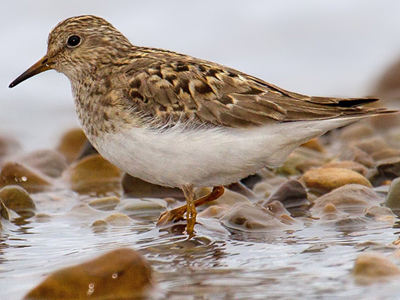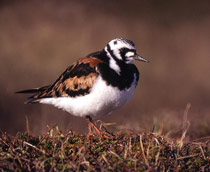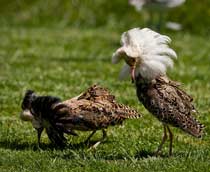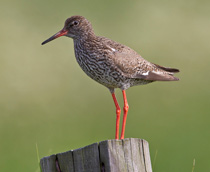
Not easy to identify as only two or three birds nest at a secret location in the Scottish Highlands.
British Birds - Sandpiper Relatives
Sandpipers have long bodies and legs, and narrow wings. Most species have a narrow bill, but otherwise the form and length are quite variable. The bills are sensitive, allowing the birds to feel the mud and sand as they probe for food. Sandpipers range in size from the Least Sandpiper, at as little as 11 cm (4.3 in) in length, to the Eastern Curlew, at up to 66 cm (26 in) in length.
To see a larger image, click on the picture.
1 .
What is the name of this bird?
Red Knot
Whimbrel
Sanderling
Common Redshank
- Group: Sandpipers and allies
- Binomial: Calidris alba
- Order: Charadriiformes
- Family: Scolopacidae
- Status: Winter Visitor & Passage Migrant
- It can be told from other small wading birds, given good views, by its lack of a hind toe.
- It is a complete migrant, travelling between 3,000 to 10,000 km.
2 .
What is the name of this bird?
Common Redshank
Spotted Redshank
Red Knot
Turnstone
- Group: Sandpipers and allies
- Binomial: Tringa erythropus
- Order: Charadriiformes
- Family: Scolopacidae
- Status: Winter Visitor And Passage Migrant
- A relatively scarce wintering species in the UK, with over half the population found at fewer than ten sites.
- These birds eat insect larvae, shrimps and worms.
3 .
What is the name of this bird?
Common Greenshank
Red-necked Phalarope
Temminck's Stint
Turnstone
- Group: Sandpipers and allies
- Binomial: Phalaropus lobatus
- Order: Charadriiformes
- Family: Scolopacidae
- Status: Winter Visitor: Scarce & Localised Summer Breeding In Far North
- These small, delicate waders have adapted well to spending a lot of time on water.
- Have lobed toes which enable them to swim strongly when out at sea.
4 .
What is the name of this bird?
Common Redshank
Red Knot
Spotted Redshank
Whimbrel
- Group: Sandpipers and allies
- Binomial: Calidris canutus
- Order: Charadriiformes
- Family: Scolopacidae
- Status: Winter Visitor And Passage Migrant
- Their diet varies according to season; arthropods and larvae are the preferred food items at the breeding grounds.
- This species forms enormous flocks when not breeding.
5 .
What is the name of this bird?
Whimbrel
Common Greenshank
Spotted Redshank
Red Knot
- Group: Sandpipers and allies
- Binomial: Tringa nebularia
- Order: Charadriiformes
- Family: Scolopacidae
- Status: Resident Breeding Species And Passage Migrant
- The usual call is a rapid series of three short fluty notes syllabilized as 'teu-teu-teu'.
- Like most waders, they feed on small invertebrates.
6 .
What is the name of this bird?
Whimbrel
Sanderling
Red Knot
Turnstone
- Group: Sandpipers and allies
- Binomial: Arenaria interpres
- Order: Charadriiformes
- Family: Scolopacidae
- Status: Resident Breeding Species
- They spend most of their time creeping and fluttering over rocks, picking out food from under stones.
- Can be seen all around the UK coastline.
- Will feed along seawalls and jetties.
7 .
What is the name of this bird?
Red-necked Phalarope
Ruff
Spotted Redshank
Common Greenshank
- Group: Sandpipers and allies
- Binomial: Philomachus pugnax
- Order: Charadriiformes
- Family: Scolopacidae
- Status: Passage Migrant And Scarce Breeding Resident
- It is highly gregarious on migration, travelling in large flocks that can contain thousands of individuals. One flock in Senegal contained a million birds.
8 .
What is the name of this bird?
Whimbrel
Common Redshank
Turnstone
Common Greenshank
- Group: Sandpipers and allies
- Binomial: Tringa totanus
- Order: Charadriiformes
- Family: Scolopacidae
- Status: Resident Breeding Species
- A medium-sized wading bird.
- In winter, as many as half of the birds in Britain may be from Iceland.
- It is an abundant and widespread wading bird on coasts - look for it at RSPB coastal reserves.
9 .
What is the name of this bird?
Whimbrel
Turnstone
Common Greenshank
Temminck's Stint
- Group: Sandpipers and allies
- Binomial: Numenius phaeopus
- Order: Charadriiformes
- Family: Scolopacidae
- Status: Breeding Summer Visitor
- The nest is a bare scrape on tundra or Arctic moorland.
- Three to five eggs are laid.
- Adults are very defensive of their nesting area and will even attack humans who come too close.
10 .
What is the name of this bird?
Spotted Redshank
Red-necked Phalarope
Temminck's Stint
Common Redshank
- Group: Sandpipers and allies
- Binomial: Calidris temminckii
- Order: Charadriiformes
- Family: Scolopacidae
- Status: Winter Visitor & Passage Migrant
- Two or three birds nest at a secret location in the Scottish Highlands, and fewer than 100 birds are seen on migration each year, largely in eastern England.
**Unlimited Quizzes Await You! 🚀**
Hey there, quiz champ! 🌟 You've already tackled today's free questions.
Ready for more?
Ready for more?
🔓 Unlock UNLIMITED Quizzes and challenge yourself every day. But that's
not all...
not all...
🔥 As a Subscriber you can join our thrilling "Daily Streak" against other
quizzers. Try to win a coveted spot on our Hall of Fame Page.
quizzers. Try to win a coveted spot on our Hall of Fame Page.
Don't miss out! Join us now and keep the fun rolling. 🎉
**Unlimited Quizzes Await You! 🚀**
Hey there, quiz champ! 🌟 You've already tackled today's free questions. Ready for more?
🔓 Unlock UNLIMITED Quizzes and challenge yourself every day. But that's not all...
🔥 As a Subscriber you can join our thrilling "Daily Streak" against other quizzers. Try to win a coveted spot on our Hall of Fame Page.
Don't miss out! Join us now and keep the fun rolling. 🎉

















